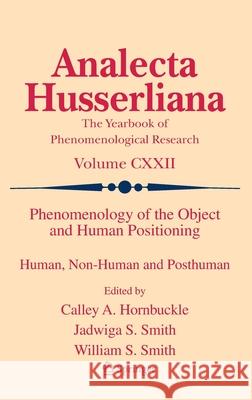Phenomenology of the Object and Human Positioning: Human, Non-Human and Posthuman » książka



Phenomenology of the Object and Human Positioning: Human, Non-Human and Posthuman
ISBN-13: 9783030664367 / Angielski / Twarda / 2021 / 329 str.
Phenomenology of the Object and Human Positioning: Human, Non-Human and Posthuman
ISBN-13: 9783030664367 / Angielski / Twarda / 2021 / 329 str.
(netto: 402,95 VAT: 5%)
Najniższa cena z 30 dni: 421,13 zł
ok. 20 dni roboczych.
Darmowa dostawa!
Part I Homage to Anna-Teresa Tymieniecka
The Subject/Object Relationship According to the Phenomenology of Life of Anna-Teresa Tymieniecka: Discovering the Metamorphic Logos of the Ontopoiesis of Life
Daniela Verducci
Otherness and the Case of the Animal-Human: Interrogating the Post-Human from Tymieniecka’s Ontopoiesis Multilayered Organization of Life
Sergio Labate
The Poiesis of Thought
Antonio Domínguez Rey
Part II Transcendental Idealism – Investigation Continues
Ecce Zarathustra: Nietzsche’s Answer to the Human
Marcella Tarozzi Goldsmith
Phenomenology, Formal Ontology, Coalgebras: A Theoretical Model of Max Scheler's Phenomenology of Perception
Martina Properzi
Puzzles in Phenomenology
Lucian Delescu
Part III Politics / Social Issues / Question of Universality
Freedom and the Human Positioning in the Lifeworld: The Transcendence-Immanence Contrast in Simone de Beauvoir’s Existentialist Feminism
Abdul Rahim Afaki and Natasha Kiran
Brave New World: A Confinement Between Mythical and Behaviourist World-Views
Aydan Turanli
The Thing/Beast/Human Relationships in the Autobiographies of Camara Laye and Wole Soyinka
Tony E. Afejuku
Part IV Art and the Question of Humanity
The Force of Things Unknown
Christopher S. Schreiner
Paul Klee’s Ad Parnassum and the Reworking of Consciousness
Bruce Ross
Transhuman and Posthuman in Popular Culture on the basis of Miura Kentarō's Berserk
Natalia Kućma
The Work of Art as a Living System: A Deweyan Approach
Stefano Polenta
Part V Human / Beast / Object
The Beast vs. Human
John N. Balsavich
The Situation of Human Being in Nature According to Fedor Dostoyevsky, Thomas Mann, and Robert Musil: A Paradoxical Builder, Self-Enhancing Being and Speaking-Animal
Michel Dion
Objects and “Objects” in the Historical Narration of the Humanities and Jean Baudrillard’s Semiotical (Structuralist) Contribution
Piotr Mróz
A Criticism of the Current Subjectivist Totemism in Werner Herzog’s Grizzly Man
Victor G. Rivas López
Part VI Human / Nature / Cosmos
Towards a Hermeneutic of the Artificial
Marie Antonios Sassine
Apeiron Civilization: The Irruption of Infinity in Science and the Universe
Ion Soteropoulos
Man as the Ambassador of the Cosmos: Henryk Skolimowski's Concept
Anna Małecka and Katarzyna Stark
Dr. Calley A. Hornbuckle is an Associate Professor of English in the School of Liberal Arts at Dalton State College, Georgia. Her scholarship focuses on British women writers and the environmental tradition.
She has published on Anna Letitia Barbauld and ecological sensibility and presented several papers on ecological intelligence in the works of Charlotte Smith, Ann Radcliffe, Dorothy Wordsworth, and Beatrix Potter. Currently, she is investigating Mary Robinson’s investigations of ethics, ethology, and aesthetics in light of recent developments in neuroscience and embedded cognition. She also serves as an executive editor for The Explicator.
Dr. Hornbuckle has presented at the World Phenomenology Institute on numerous occasions
Dr. Jadwiga S. Smith is emerita Professor of English at Bridgewater State University where she has worked for thirty-two years. She earned two master’s degrees in European and Slavic literatures from Jagiellonian University in Krakow, Poland, where she developed an early interest in phenomenology. Graduate studies took Dr. Smith to Duquesne University, where she earned a Ph.D. in English literature; she wrote her dissertation on the phenomenology of Roman Ingarden and its application to the stage play. She has continued to publish countless scholarly articles on phenomenology, literary theory, and drama in the Analecta Husserliana, the Phenomenological Inquiry, and other journals.
In the early 1980s, Dr. Smith began working with Dr. Anna-Teresa Tymieniecka and became a major collaborator in the World Phenomenology Institute. After Dr. Tymieniecka’s death, Dr. Smith became the WPI President for the American Division. She continues this important work today, organizing and administering conferences, conducting and leading conferences, and editing volumes of the Analecta Husserliana: The Yearbook of Phenomenological Research. Dr. Smith remains a vital, enthusiastic, inspiring link in the World Phenomenology Institute where she encourages younger scholars to pursue phenomenological studies.
Dr. William S. Smith is emeritus Professor of English and Dean of the College of Graduate Studies at Bridgewater State University in Bridgewater, Massachusetts, where he worked for thirty plus years. Graduating from Duquesne University with a Ph.D. in English literature, he has spent forty years in higher education. Dr. Smith’s scholarly interests and areas of specialization include nineteenth-century British literature, particularly the poetry of William Wordsworth and the Gerard Manley Hopkins. Of particular interest are the epistemological traditions extending across the poetic landscape of the nineteenth century. His scholarly articles have appeared in the Phenomenological Inquiry and the Analecta Husserliana.
Dr. Smith’s relationship with the World Phenomenology Institute began in the mid-1980s and continues today as the Executive President of the WPI. These administrative responsibilities are many, including managing the WPI staff, organizing conferences, administering funding sources, and editing the Analecta Husserliana: The Yearbook of Phenomenological Research
This edited volume explores the intersections of the human, nonhuman, transhuman, and posthuman from a phenomenological perspective. Representing perspectives from several disciplines, these investigations take a closer look at the relationship between the phenomenology of life, creative ontopoiesis, and otherness; technology and the human; art and the question of humanity; nonhumans, animals, and intentionality; and transhumanism. Ontological positioning of the human is reconsidered with regard to the nonhuman, transhuman, and posthuman within the cosmos. Further examination of the artificial and object in the lifeworld is also explored. This volume also pays tribute to Anna-Teresa Tymieniecka and her methodical contributions to phenomenology. This text appeals to students and researchers of phenomenology worldwide.
1997-2024 DolnySlask.com Agencja Internetowa
KrainaKsiazek.PL - Księgarnia Internetowa









